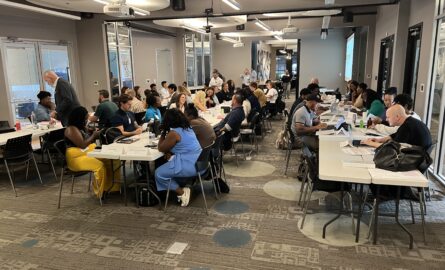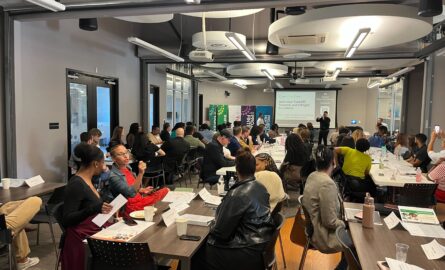An Interview with Jason Moore
Jason Moore is a full circle moment. He was the very first entrepreneur that worked with the EC. Clayton was chair, Michael Burcham was CEO, and the organization was on Broadway. Jason and his company Stratasan is one of seven exits in 2022, but what makes Jason special is that he’s doing exactly what the EC set out to do – paying it forward to help the next generation of founders as a member of The McWhorter Circle.

What is one of the first stories that you think of when you hear the EC?
There’s not a better memory than the very first day I walked in to pitch with Michael Burcham. The night before he said, you know, you can come in tomorrow and pitch. I was not prepared for that but stayed up all night building the deck. I thought the pitch was going fantastic and at the end of it, Michael looked at me and said, ‘Jason, I like you, I think you’re onto something’ followed with, ‘and that’s the worst pitch I’ve ever heard. But if we’re gonna be good at what the Entrepreneur Center is supposed to do, then you’re the type of entrepreneur we should be able to help.’ The tagline then, when the EC first started, was Create Your Investible Story.
So that kind of goes into the genesis of Stratasan. How did that idea first come about?
I had zero experience in healthcare. I’m not a data analyst or a data scientist, and I’ve never written a line of code. What I did have was 10 years of operating a SaaS model company combined with the talent in Nashville around healthcare and data analytics. Everything is healthcare here. I started networking and compiling a list of people that were open to advising and mentoring me. It was one of the advisors that knew this was a problem, so the genesis was from that advisory committee.
What’s one book that you’ve read that’s influenced you as an entrepreneur?
You know, a book that I reference a lot, especially for entrepreneurs that are struggling to get started is E-Myth Mastery by Michael Gerber. The core of the book is to take the time to work on your business, not just in your business. You can read it on a flight from Nashville to Chicago.
From the beginning, was your initial idea to sell?
When you start a company, there’s always going to be an end. We weren’t building to sell, or to exit, or to IPO. We wanted to build a good company that we wanted to work at, and other people wanted to work for. We had a theory that if we focused on that, a good outcome is more likely. I think we did just that.
Could you talk about your co-founder?
Our co-founder Brian Daley stayed through the whole time. We had a 12 year partnership that was unbelievable. People see that he’s the CTO, so they assume that he’s good at technology, which is very much true but his overall business acumen as we grew up together in this business grew and grew and grew!

How did you meet your team? Through networking, friends?
Jason Haley, our first hire, is a good example here. He is cousins with the first COO of the Entrepreneur Center, so it was actually an introduction from an EC connect. The Entrepreneur Center’s fingerprints are all over Stratasan.
When did you know you had something going – that something valuable was being built?
We had a ton of lucky bounces over the years. Our first was shortly after funding. Mid 2011, we had met a friend of a friend who happened to be high up at LifePoint Health. Her name is Melissa Waddey. I really wanted to learn from her and what we could build that would be useful for someone in her position, and in her world. She mentored really well and long story short, we ended up signing a multi-year contract with LifePoint Health six months after.
What was one of the biggest challenges while scaling?
I think it’s really important to continuously check as a founder, ‘Am I the right leader of this company today?’ There were times I was uncertain of that. I went through a rigorous self-check about six years in, but I had a good group of people around me that gave me constructive feedback.
What made you decide to sell when you did?
We’d grown to a point and brought on new investors in 2019 with a full recipe and growth round. Three years later, we tripled in revenue, so that was attractive. It was really a ‘lets see what the market thinks about us’. Our strategic buyer who eventually acquired us, came in cold. Their vision was so lockstep into what my and our senior leadership team’s vision was of Stratasan. With them as a partner, it appeared that we would be able to do something, instead of in three to five years, let’s say 18 months to two years.
What’s something you’ve done to make sure your team was excited about this transition?
When you are going through the process, it’s hard to be fully transparent. That was difficult because we built a wide open and transparent culture. As we were dating through the process, it was really about asking, ‘Is this a place our people are going to be able to grow?’ Every step of the way, we felt stronger and stronger about that based on the acquiring company’s leadership team and how we were going to work together.
What is something that you are learning right now?
The former COO of Stratasan and I have started a consultancy, DNA Partners, to help growth stage companies get to “scale stage”. So not helping startups, not trying to find product market fit or your first go-to-market strategy, but let’s say, two to three million in recurring revenue, and trying to get to that 20, 30, 50, million in revenue so you can get the scalable platform. Right now I’m learning how to try to apply 20 plus years as an entrepreneur, packaging it up to be helpful to others.
This interview is featured in our 2022 Annual Report. To read the full Annual Report, click HERE.



